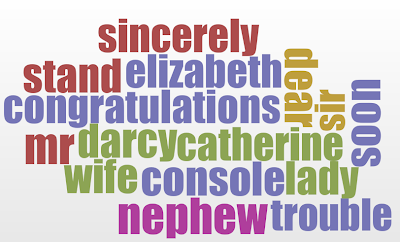Clearly, Collins’s main goal in this letter is to show off his newly acquired status – more than introduce himself to the family, he wants to introduce his position to the family, and though he’ll take over the Bennet estate when Lizzie’s father dies, Collins wants to give the daughters a chance to atone for the terrible misfortune of the Bennets’ not having a son.
Chapter 26, Jane to Lizzy
This letter, from Jane to Lizzy, very clearly illustrates the depth of feeling which characterizes Jane. The major words in her letter have to do with a feeling of anxiety, and are often related to her being the older sister, and feeling a measure of responsibility for her family’s and her own situation. She often tries to explain away others’ actions, and see the best in any given situation.
Chapter 35, Darcy's Letter
Darcy realizes that one of Lizzie’s biggest issues with him lies in the supposed mistreatment of Wickham, so the letter focuses on that particular problem. Darcy himself places a large emphasis on family, though not necessarily seen in his actions, as can be interpreted from the fact that several of the most common words are those relating to family. As such, Darcy would do anything for his family, and anything for his love’s family to keep their standing.
Chapter 46, Jane to Lizzy
This letter particularly expresses Jane’s devotion to her family, and their issues, as opposed to just her own feelings in any matter. Notice how none of the major words have anything to do with how Jane herself is faring in light of this matter, but most pertain to other people in the family, or the situation as a whole.
Chapter 46- Jane to Lizzy Number 2
Once again, this sequence of letters has much to do with Jane ensuring that everyone else has what they need, and knows everything going on. Jane once again forgoes telling Lizzy how she (Jane) is, and instead makes sure Lizzy is fully up to speed on the goings-on of the last few days. Everything revolves around everything else for Jane, nothing revolves around Jane herself.
Chapter 47, Lydia to Mrs. Gardiner
Obviously, Lydia does not have the same consciousness for others that her sisters have; the letter mostly revolves around Lydia and what Lydia has done, is doing, and is feeling, and how she thinks everyone else will react to her situation. This is most likely a result of how her mother brought her up – to think of marriage and nothing else.
Chapter 48, Collins to Mr. Bennet
Once again, Collins has demonstrated through his letter that the pompous outside continues on to the inside as well. This time, Collins’s focus leans towards the new acquisition of his wife, and the loss the Bennet daughters have experienced following Elizabeth’s rejection of Collins’s proposal. He becomes extremely patronizing, as the words “dear” and “sir” would suggest.
Chapter 49, Mr. Gardiner to Mr. Bennet
Though we don’t see very much of Mr. Gardiner, the Bennet girls’ uncle, this letter opens up a character who doesn’t say very much in common conversation. Mr. Gardiner seems to be a very family-oriented person, committed to making sure everyone in his family is informed as to the current situation, and safe in any situation which he can control.
Chapter 50, Mr. Gardiner to Mr. Bennet Number 2
Once again, Mr. Gardiner’s rather introverted character is brought to light through his letter to his brother. Mr. Gardiner’s greatest concern in this letter is ensuring that although Lydia may not have married into the best situation, she will have the best possible life out of that situation. This includes Mr. Gardiner doing everything he can to ensure that Wickham’s credit is clean, as the more major words, such as “assurances,” “hope,” and “creditors” would suggest.
Chapter 52, Mrs. Gardiner to Lizzy
Mrs. Gardiner often speaks up more than Mr. Gardiner, and for the most part seems to be a very caring aunt – possibly the one adult female role model in Jane and Lizzy’s lives who cares for their feelings rather than their being married. Her letter surely confirms that her personality in her small words and actions is indeed true. Though Mrs. Gardiner was not supposed to tell of the events that transpired around the time of Lydia’s marriage, she tells Lizzy anyway, just because Mrs. Gardiner knows that Lizzy is extremely eager to know the details, and just how much her family owes Mr. Darcy.
Chapter 60, Lizzy to Mrs. Gardiner
Lizzy generally doesn’t send letters in this book, as her thoughts and feelings are most intimately known through Austen’s commentary. However, this particular letter sheds an interesting light on her character. Lizzy seems to be one of the most down to earth characters, and yet her major word is “world.” Perhaps she is, in fact, more of a dreamer than we might initially think, and really all she wants is her world to be a dream one. She really feels that she has the best life in the world, after she marries Darcy.
Chapter 60, Mr. Bennet to Mr. Collins
This letter sums up Mr. Bennet to a tee. He doesn’t mess around, he likes to be simple and quick, and if he can throw in a little sass somewhere, it’s all for the better. Truly, Mr. Bennet’s transparency stands as one of the most undeniable truths of the novel.
Chapter 61, Lydia to Lizzy
Once again, Lydia demonstrates that her selfishness isn’t purely a surface matter, but a deep characteristic of her most basic form. Even when her older sister is about to me married, Lydia’s letter focuses more on her own life and husband than congratulations for her dear sister.













No comments:
Post a Comment